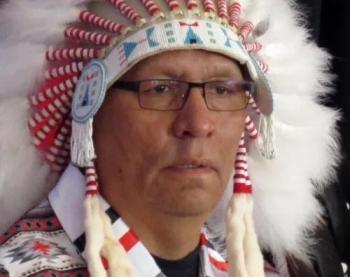Image Caption
Summary
Local Journalism Initiative Reporter
Windspeaker.com
Craig Makinaw was “thinking about how things are” and that thought led him to a very last-minute nomination as national chief of the Assembly of First Nations.
How things are, he says, relates to “all that's happened over the last year with AFN internally and we just need to work at it to make things better. And I think that’s something I could help with (by) working with the chiefs and the regional chiefs.”
Over the past two-and-a-half years, tension has run high within the AFN amongst leaders and staff. The last elected national chief, RoseAnne Archibald, was ousted in a battle that pit some community chiefs against the AFN executive at times.
Makinaw says the fact that he wasn’t a “part of what happened at AFN, I come with a whole different perspective.”
He admits that his different point-of-view may frighten some chiefs, but he puts those fears to rest by drawing on the 30 years of experience he has to offer.
“I come in with that experience that will help out,” he said.
Makinaw served as chief of the Ermineskin Cree Nation (Maskwacis, Alberta) for two separate terms. Although he was unsuccessful this past July running for chief for Ermineskin Cree Nation, he is presently serving as councillor. He was also grand chief of the Confederacy of Treaty Six from 2012 to 2014.
Makinaw is no stranger to the AFN executive, having served as regional chief for Alberta from 2015 to 2018. However, Alberta hasn’t had a regional chief since 2021. Makinaw’s successor Marlene Poitras was removed from the position in 2022 through a vote by Alberta chiefs. And many Treaty 8 nations in the province don’t want to be involved with the AFN.
Makinaw says Alberta chiefs in Treaty 6 and 7 make up just over half of Alberta’s 49 First Nations. They remain involved with the AFN. For the rest of them, he wouldn’t comment on the situation beyond saying it’s a decision that’s in the hands of Alberta chiefs and “I have to respect it.”
However, he’s hopeful that he can initiate discussion with them.
“Being a chief for two terms, I can bring that experience at a table where I could help out in getting solutions and moving things ahead,” he said.
In the larger overall picture, moving AFN forward, including any structural changes, won’t be a quick fix, says Makinaw.
“It has to be a work in progress with the chiefs and the regional chiefs,” he said.
And to that end, his top priority will be fixing the relationship between chiefs and the national chief.
“Right now the relationship needs to be worked on. The national chief will have to work with the chiefs to try and get that relationship repaired and getting it back to normal,” he said. “We need to have a better relationship.”
Makinaw will focus on inclusive leadership that allows for respectful voices and is reflective of all points of view.
The AFN will also have to advocate for the chiefs with the federal government.
Makinaw says that any strategic plan that includes the federal government, regardless of its political stripe or leader, needs to move issues forward.
However, right now, he says, he will work with the Trudeau Liberal government and advocate for chiefs and First Nations and will work with whoever voters choose in the next federal election.
Collective action, he says, is the key to addressing challenges faced by First Nations.
Helping First Nations participate as equitable partners in natural resources is a priority in Makinaw’s platform.
After all, he is a founding member of Natural Law Energy, which originally came about as a coalition of First Nations in western Canada with a mandate to pursue economic wealth and benefits for Indigenous peoples. That mandate includes working with nations interested in pursuing an equity share in the Trans Mountain pipeline.
“When you talk about natural resources, you have to work with the chiefs so that they're involved in the process,” said Makinaw, who adds that it’s a balance between economic development and respecting the environment.
As for chiefs who “aren't for natural resources,” he said, “you have to look at everybody and treat all the chiefs fair, so that they're heard and their decisions are respected.”
Resolutions passed by chiefs in assembly must be dealt with, he says. He lists action required on the missing and murdered Indigenous women and girls portfolio, unmarked burial sites at Indian residential schools, child welfare, access to clean drinking water, and actualizing the United Nations Declaration on the Rights of Indigenous Peoples.
“There's a lot of issues that need to be dealt with, that need to be looked at. So it's an ongoing thing. You can't really say two or three items because there's so many that need to be dealt with,” said Makinaw, adding that all the issues will keep the national chief’s office busy.
He also notes that work needs to be done with Bills and issues with the federal government.
“We need to concentrate some more on that and especially with Indian Act and other issues that are being tabled in Parliament. We have to keep our eyes on those issues too at the same time while we're dealing with these other ones that are presently on the table that the chiefs are looking at,” said Makinaw.
Keeping that balance, he adds, will involve coordinating with chiefs and setting priorities and deadlines, something he feels confident he can accomplish.
********************
Windspeaker is owned and operated by the Aboriginal Multi-Media Society of Alberta, an independent, not-for-profit communications organization.
Each year, Windspeaker.com publishes hundreds of free articles focused on Indigenous peoples, their issues and concerns, and the work they are undertaking to build a better future.
If you support objective, mature and balanced coverage of news relevant to Indigenous peoples, please consider supporting our work. Whatever the amount, it helps keep us going.

